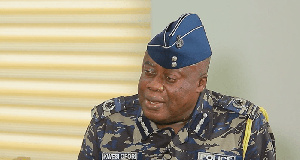- Home - News
- Polls
- Year In Review
- News Archive
- Crime & Punishment
- Politics
- Regional
- Editorial
- Health
- Ghanaians Abroad
- Tabloid
- Africa
- Religion
- Election 2020
- Coronavirus
- Photo Archives
- News Headlines
- Press Release
General News of Friday, 31 December 2021
Source: 3news.com
Violence in 2020 elections: We’re having challenges getting witnesses – Police
The Ghana Police Service has said that investigations are still ongoing into the violence that occurred in some parts of the country during the 2020 general elections, the Director of Public Affairs of the Ghana Police Service, ACP Kwesi Ofori, has said.
He revealed that some of the cases are ready pending advice from the Attorney Generals' office.
“During the elections, the Police did everything to ensure that the elections was successful. Flaws and other incidents that happened, the Police took most of them to the court."
“There are some that are also under investigation; there are some before the Attorney General’s office for direction, there are some that we are still being investigated. I believe that so far so good the Police have been up and doing.
Humans are we are, there might be some flaws, there might be some delays due to technical issues because most of the cases need some kind of forensic examination, filed service analyses, expert opinions coming in, and also contacted witnesses. There are challenges in getting witnesses and there are some that witnesses have come forward."
“At the end of the day, as a nation, I believe that we are doing well. The Police in itself is democratic in nature,” ACP Kwesi Ofori said in the 2021 Year In Review, Wednesday, December 29.
During the polls, a total of 61 electoral and post-electoral incidents were recorded nationwide, the Ghana Police Service announced in a statement on Wednesday, December 9, 2020.
The statement said 21 of the incidents were true cases of electoral violence, six of which involved gunshots, resulting in the death of five.
The Police’s statement further noted that there were several fake news about supposed electoral violence.
“However, between 0700 hours of 7th December 2020 and 1000 hours of 9th December 2020, the Joint Operation Centre of the NESTF has recorded a total of sixty-one (61) electoral and post-electoral incidents nationwide. Twenty-one of the incidents are true cases of electoral violence, six of which involved gunshots resulting in the death of five,” the statement from the Police emphasized.
Chair of the Electoral Commission (EC) of Ghana, Mrs. Jean Adukwei Mensa expressed concerns about the deaths that characterized the 2020 general elections.
Speaking at an Inter-Party Advisory Committee (IPAC) meeting in Accra on Tuesday, May 18, Mrs. Adukwei Mensa said “An exceedingly disturbing challenge is the violence which led to the death of citizens of our country.
“And we say never again. Never again should we go to an election and have anybody lose their lives. Here also, there is a tendency for fingers to be pointed at the EC when security is not the core mandate of the EC.
“I have read the constitution and security is not part of our core mandate. I use this occasion to clarify that the EC is not responsible for election security, although the entire election and its success rest on the shoulders of the Commission. Our mandate as entrenched in the Constitution does not include security.”
She further proposed that voting in Ghana’s election should close at 3PM rather than the 5PM.
“We propose closing the polls at 3pm rather than 5pm. In 2019, we announced our decision to close the polls at 3pm rather than 5pm, in the 2020 Elections. Nonetheless, owing to the COVID-19 pandemic and the stringent, and necessarily time-consuming safety protocols we instituted at our polling stations, we were compelled to put this proposal on hold.
“Over the past months, however, this proposal has re-surfaced from various sections of the public, and indeed, our own experience from the 2020 Elections has revealed that it is a workable proposal, as, by 1pm, most polling stations were empty, suggesting that this is a workable proposal. Therefore, this is a reform we intend to put forward.”
Other proposals she made include: “Again, we propose to do away with the system of periodic nationwide registration exercises, and institute an all-round system where citizens who turn 18, or persons who have not previously registered, may visit any district office with their Ghana Card or passport and register as voters. This will help us do away with nationwide registration exercises and go a long way to reducing the cost of elections.
“We further propose a year-round exhibition system that will enable citizens to check their registration details on their smartphones and other mobile devices. Citizens would not need to wait for an exhibition exercise to check their details. They will be able to do so, all year round.
“We propose to build further efficiency into our collation process by focusing on data entry only at the Constituency Collation Centre. The entry point for data capturing into the system will be at the Constituency Collation Centre. The data i.e. Constituency Collation Results will be made available to all stakeholders at the Regional and National levels.
Flowing from the data captured at the Constituency Collation Centre, the system will generate regional and national reports without further data entry at any of those levels. By adopting this system, the problem of minor inaccuracies with the collation process and unnecessary delays will be reduced significantly.”
Entertainment










